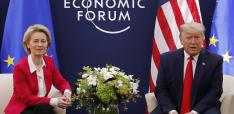To Be “Better” The World Bank Must Center Citizens

Pouring billions into emergency projects without sufficient citizen input undermines effectiveness.
The bad news remains relentless these days – from the devastating war in Sudan to recent floods in India and Bangladesh to the unbelievable suffering in Gaza. Only 15% of the Sustainable Development Goals are likely to be met by 2030 – global development has gone into reverse as a result of the pandemic, conflict, debt, corruption and authoritarianism.
Gathering and channeling the necessary funding towards these challenges is part of the essential role the World Bank plays, and it is aiming to confirm as much as $100 billion within the next few months. Since joining last year, President Ajay Banga has consistently mentioned the idea not just of a bigger World Bank but a “better” Bank, with a focus on speeding up processes, streamlining systems and freeing up staff time.
There is no doubt this is all important, but the focus on channeling massive amounts of funding during repeated emergencies into unstable places with weak governance poses obvious problems. Let’s not forget the staggering amounts of fraud during the COVID-19 response for example – which totaled billions of dollars in the US alone – and much more in percentage terms elsewhere around the world. Or indeed, the windfalls countries have been squandering on the back of revenues from critical minerals which are fueling green technologies – as if we have learned nothing from previous “resource curses”.
The quality of World Bank funding must not be lost in the clamor for quantity. The good news is that the World Bank already has an incredible, diverse, dedicated coalition of willing allies, ready to ensure the integrity and accountability of its funds and of the governments that borrow from it. Namely: us – citizens and civil society organizations (CSOs) everywhere.
You might not think of yourself in this way, but all of us have helpful skills the World Bank can use – we live in places where projects may be going astray; we have knowledge of local political dynamics that may affect implementation; and we are part of communities that can provide ideas and oversight. But unfortunately the Bank does not yet take us seriously as partners. It is reneging on its commitments to ensure that governments engage with their citizens, limiting transparency around its actions and diverting attention away from issues, like civic space, which affect everything from human rights to media freedoms.
In the long run, a focus on spending without sufficient citizen engagement and civil society support will only undermine the development outcomes the Bank is trying to achieve, which is precisely the reason the World Bank adopted a citizen engagement framework in 2014. However, the Bank is falling short in effective implementation and quality of citizen engagement as pointed out by several independent studies including by the Bank itself.
To be meaningfully better, the World Bank must center citizens in three key ways. First, by improving how citizens are engaged in the Bank’s work. For too long the Bank’s efforts to engage citizens has been a check box exercise – about compliance and risk management rather than meaningful mutual accountability. As part of its current reform process, President Banga has the opportunity to put in place more substantive citizen feedback processes by better incentivizing community involvement in project design and oversight, and finding ways to better measure the quality of civic engagement.
Second, by expanding partnerships with CSOs to monitor and oversee what it does. This will help detect and prevent waste, fraud and corruption and bolster civil society to reinforce the social contract between those in power and ordinary people. Setting up mechanisms to proactively work with CSOs, especially in difficult places, will allow for better understanding of civic space issues; and deliver better and faster results than governments and the Bank can achieve alone. The case of the Ghana Energy Development and Access Project (GEDAP) indicates both what can go wrong with World Bank spending if civil society is not engaged; and the value that independent civil society organizations can ultimately provide in terms of scrutiny and accountability.
And third, by massively increasing the support that the World Bank can provide to civil society directly, as opposed to governments. This requires a dedicated funding facility that can crowd in philanthropy to build on previous efforts within the Bank – matched with the wrap-around ecosystem building support that civil society needs to ensure better governance as trillions of dollars flow to governments. This does not mean contracting elements of the Bank’s work to professionalized NGOs, it means creating a facility that systematically bolsters civil society group capacity and networks from the bottom upwards.
Ahead of the UN General Assembly this month and the World Bank Annual Meetings in October we welcome the call from our friends at Global Citizen and others for a $50 million fund within the World Bank for independent civil society – but this is a tiny amount of money and is very much a starting point. Any level of investment in CSOs working on governance and accountability makes sense. Partnership for Transparency Fund (PTF) research indicates that if civil society oversight prevents as little as 1% of corruption in World Bank funds it would quickly pay for itself. The value of this approach is self-evident.
It would be short-sighted for President Banga to streamline the World Bank’s processes to spend billions more dollars in the short-term, only for this to undermine the legitimacy and effectiveness of the Bank in the longer-term as global crises multiply. To be better, the Bank must center citizens. It is only in this way that it can truly function as a “World Bank” in the real sense of the words.
Blair Glencorse is Co-CEO of Accountability Lab. Vinay Bhargava is Chief Technical Advisor at the Partnership for Transparency Fund.
This was shared from Accountability Lab.
IMage: By Patrick Gruban, cropped and downsampled by Pine - originally posted to Flickr as UN General Assembly, CC BY-SA 2.0


